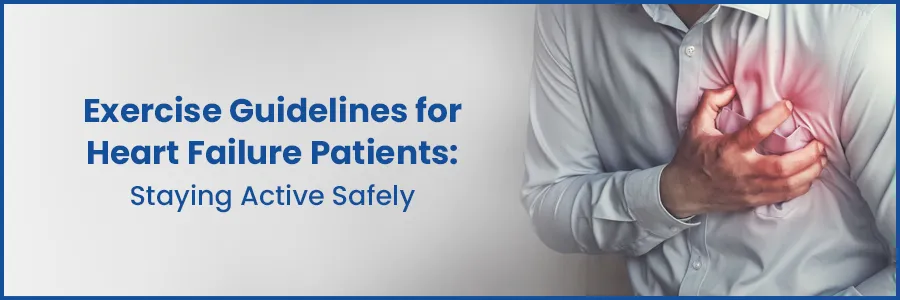- Cardiology 84
- Dermatology 45
- Endocrinology 33
- ENT 16
- Fertility 190
- Gastroenterology 78
- General-Medicine 81
- Gynecology 80
- Hematology 19
- Infectious-Diseases 33
- Neurology 52
- Oncology 34
- Ophthalmology 23
- Orthopedics 69
- Pediatrics 31
- Procedure 23
- Public-Health 144
- Pulmonology 59
- Radiology 8
- Urology 68
- Wellness 161
- Woman-and-child 77

Best Exercise Tips for Heart Failure Patients
Living with heart failure doesn&'t mean you have to give up on staying active. Exercise can be valuable in managing heart failure and improving your overall well-being. However, exercising cautiously and following specific guidelines is crucial to ensure safety.
In this guide, we&'ll explore the importance of exercise for heart failure patients and provide actionable guidelines to help you stay active while minimising risks.
Secure your health with a second opinion. Make informed decisions and book your appointment today!
Get A Second OpinionThe Importance of Exercise for Heart Failure Patients
Regular physical activity offers several benefits to individuals with heart failure:
- Enhanced Cardiovascular Fitness: Controlled exercise can improve your heart&'s efficiency, boosting its ability to pump blood effectively.
- Increased Muscle Strength: Exercise helps strengthen the muscles, reducing the workload on the heart.
- Improved Mood: Physical activity releases endorphins, positively impacting your mood and reducing stress.
- Weight Management: Exercise can aid in maintaining a healthy weight, which is necessary to maintain heart wellness.
- Enhanced Blood Circulation: Physical activity helps optimise blood flow, supporting cardiovascular function.
Exercise Guidelines for Heart Failure Patients
- Consult Your Healthcare Provider: Consult your doctor before getting started on any workout routine. To assess your fitness level and receive personalized recommendations.
- Choose Low-Impact Activities: Choose gentle activities for the joints and heart. Walking, swimming, stationary cycling and light resistance training are excellent options.
- Warm-Up and Cool-Down: Begin each session with a 5-10 minute warm-up and end with a cool-down period to gradually elevate and lower your heart rate.
- Monitor Your Heart Rate: Maintain a heart rate within your prescriSafe Exercise Tips for Heart Failure Patients range. Your physician may help you with figuring out your goal heart rate zone.
- Focus on Regularity, Not Intensity: Consistency is critical. Aim for at least 150 minutes of moderate-intensity weekly exercise, divided into manageable sessions.
- Listen to Your Body: Pay attention to any signs of discomfort, shortness of breath, or excessive fatigue. Stop exercising if you experience any adverse symptoms.
- Stay Hydrated: Proper hydration is crucial. Drink water before, during, and after your workouts.
- Avoid Extreme Temperatures: Extreme heat or cold can strain your heart. Opt for indoor activities during extreme weather conditions.
- Include Strength Training: Light resistance exercises using bands or light weights can help build muscle strength and improve endurance.
- Work with a Professional: Consider working with a certified cardiac rehabilitation specialist or personal trainer experienced with heart failure patients.
Ready to take control of your health journey? Book your appointment now and start your path towards wellness today!
Book an AppointmentExercise is crucial for managing heart failure patients&' condition. While it may not reverse heart failure, it significantly improves symptoms and quality of life. Congestive heart failure exercise routines should be tailored to each individual, focusing on the best exercise for heart failure, such as moderate aerobic activities and strength training.
Walking, cycling, and swimming are safe exercises for heart failure patients. They enhance cardiovascular health without overstressing the heart. Engaging in a supervised exercise program ensures patients can safely benefit from physical activity.
Conclusion
Incorporating exercise into your daily routine can significantly improve your quality of life as a heart failure patient. Work closely with your healthcare provider and tailor your exercise routine to what feels comfortable and safe to manage your heart condition effectively.
Frequently Asked Questions
Yes, but following specific guidelines is crucial to ensure safety and benefit.
Low-impact activities like walking, swimming, and light cycling are generally recommended.
Consult a healthcare provider for personalized recommendations, but 3-5 times a week is often suggested.
High-intensity exercises or heavy weightlifting may not be safe. Consult a doctor for guidance.
Monitoring heart rate, staying hydrated, and recognizing fatigue are crucial precautions.
Regular, safe exercise can enhance cardiovascular function and overall well-being.
Begin slowly, gradually increasing intensity. Consult a healthcare professional for a tailored plan.
If you experience severe shortness of breath, chest pain, dizziness, or extreme fatigue, stop and seek medical help.
Especially in the beginning, having someone around in emergencies is advised.
Keep a journal of your workouts, noting any changes in your feelings. Regularly discuss progress with your doctor.

- Cardiology 2132
- Dermatology 168
- Endocrinology 135
- ENT 97
- Fertility 217
- Gastroenterology 232
- General 478
- General-Medicine 1685
- Gynecology 169
- Hematology 85
- Infectious-Diseases 208
- Neurology 207
- Oncology 345
- Ophthalmology 65
- Orthopedics 187
- Pediatrics 83
- Procedure 72
- Public-Health 209
- Pulmonology 126
- Radiology 13
- Second Opinion 311
- Urology 294
- Wellness 600
- Woman-and-child 447
- Others 10217
Related Blogs
If you have any questions, please fill out the enquiry form or call us, and we will get back to you promptly.
040-68334455